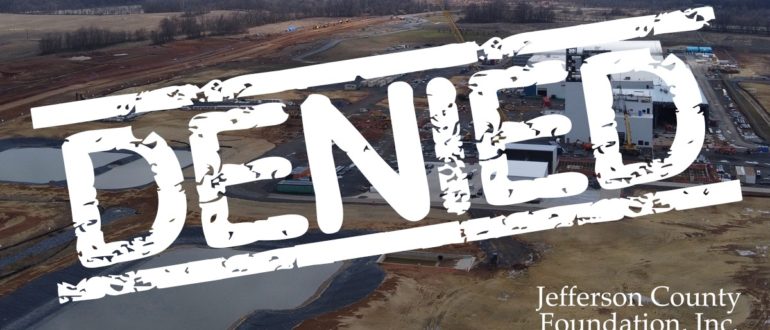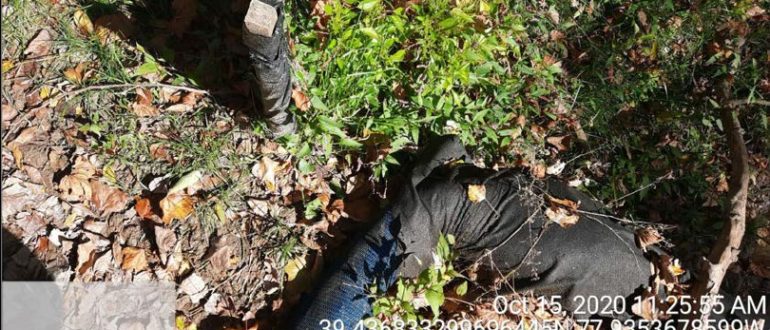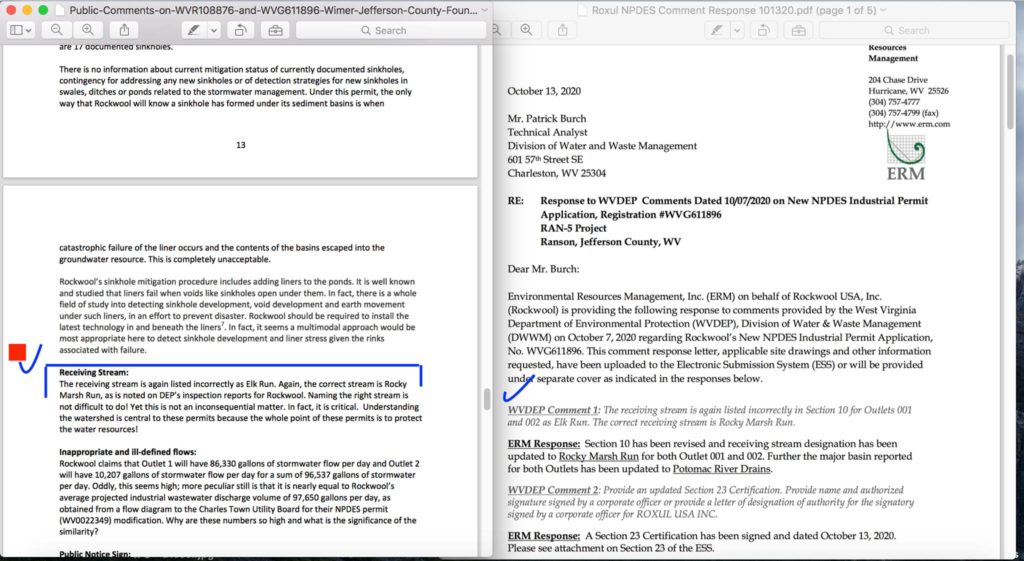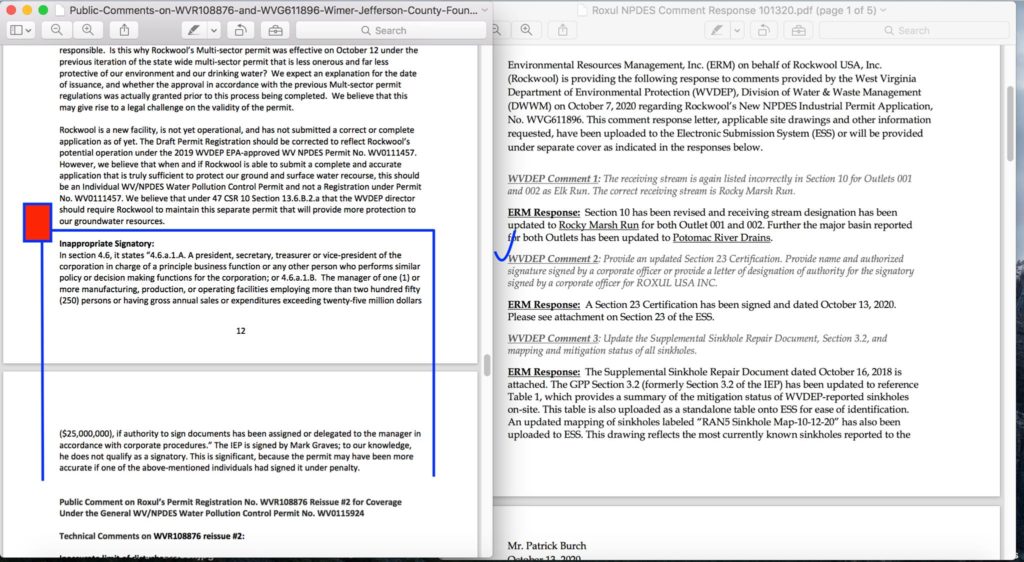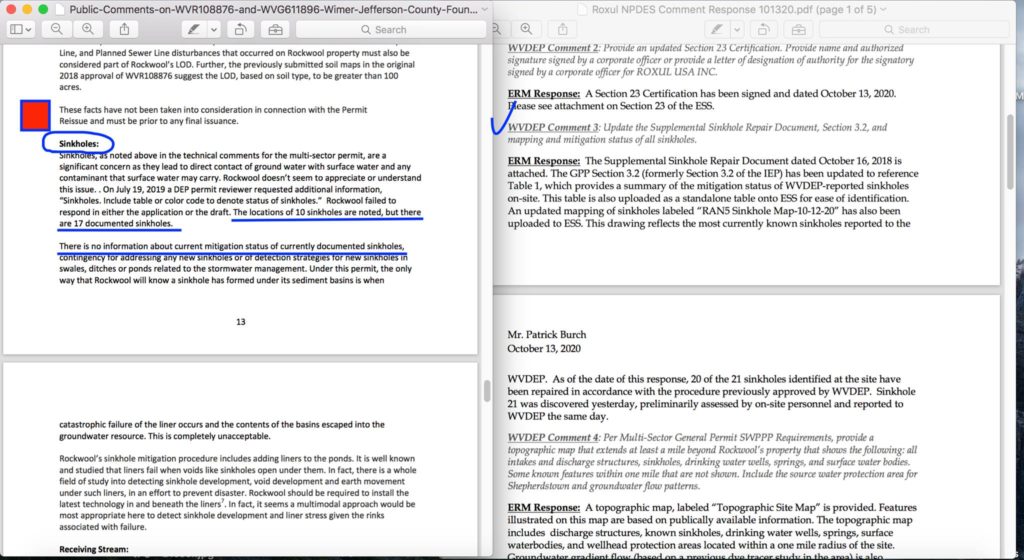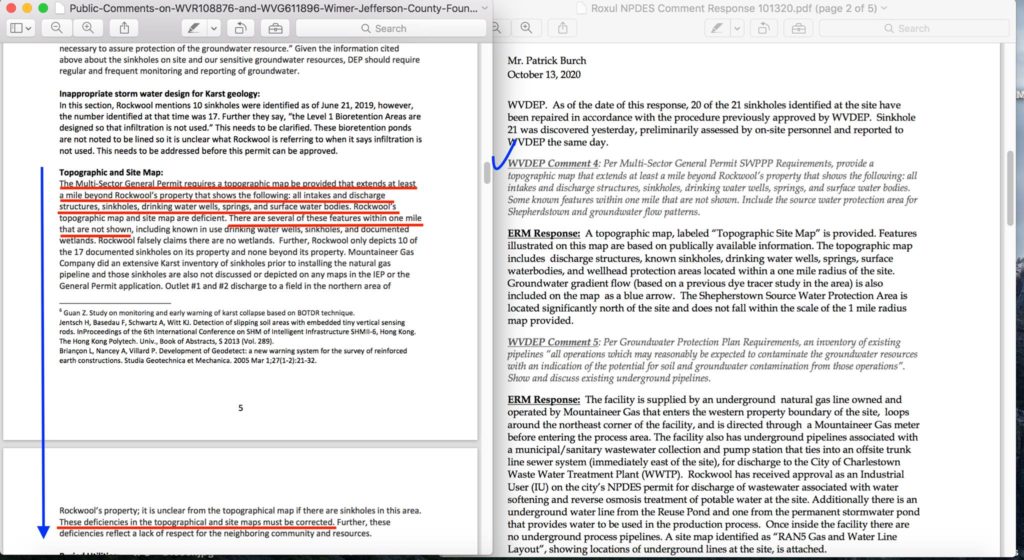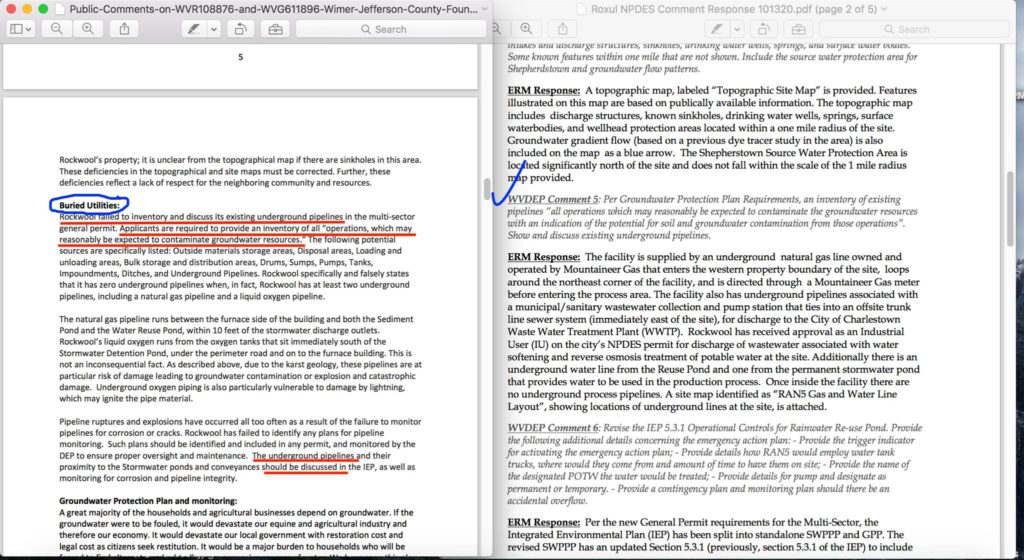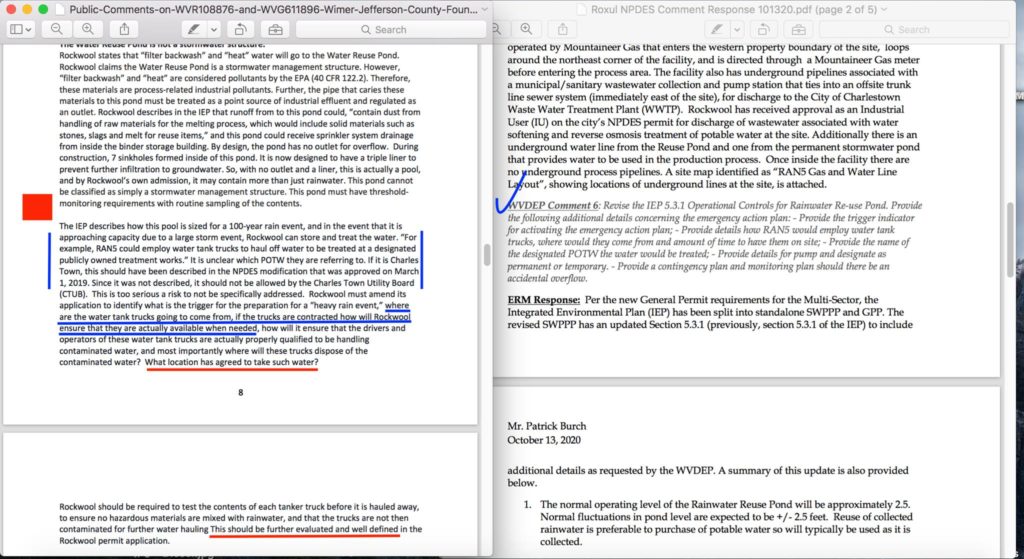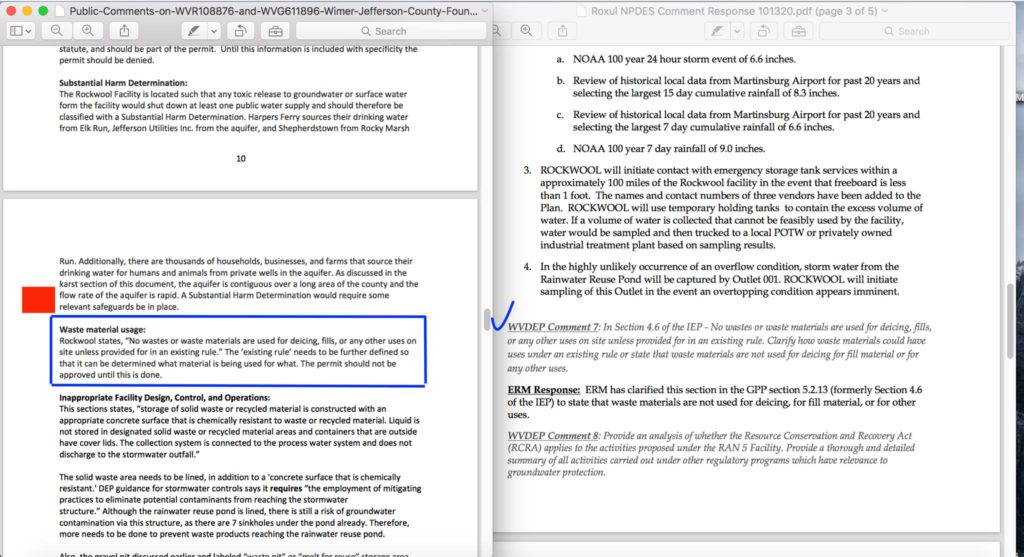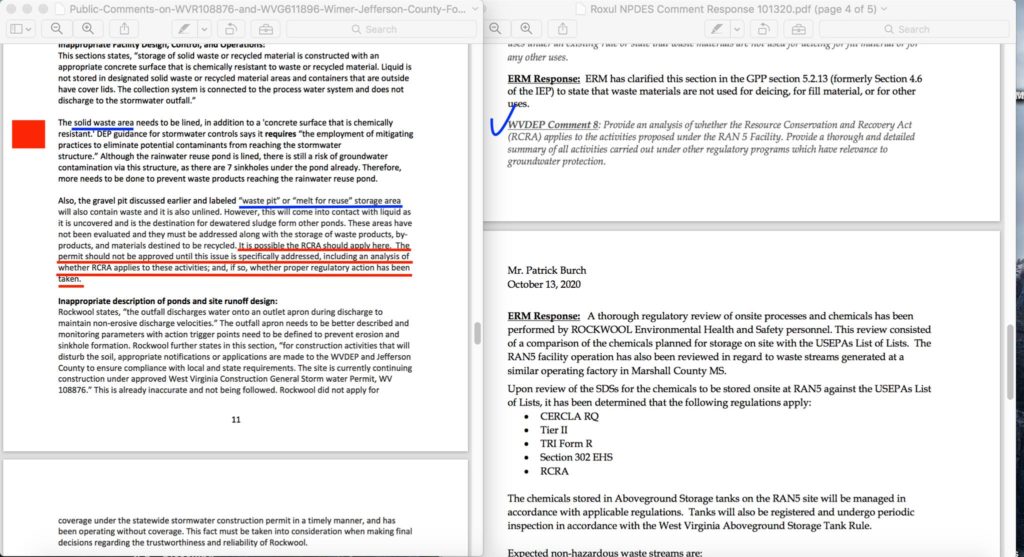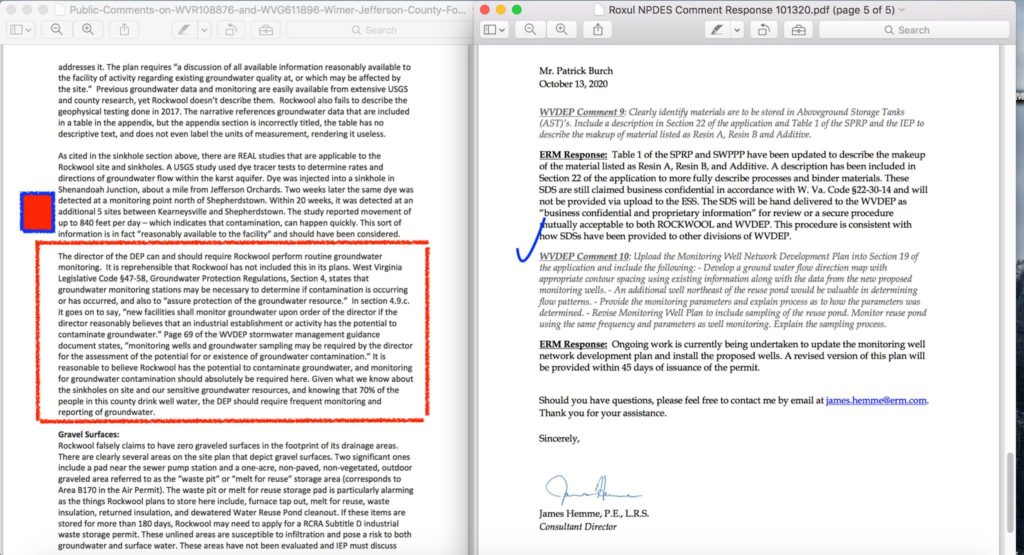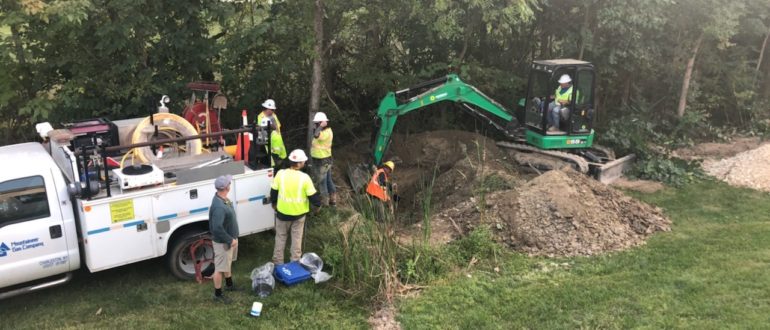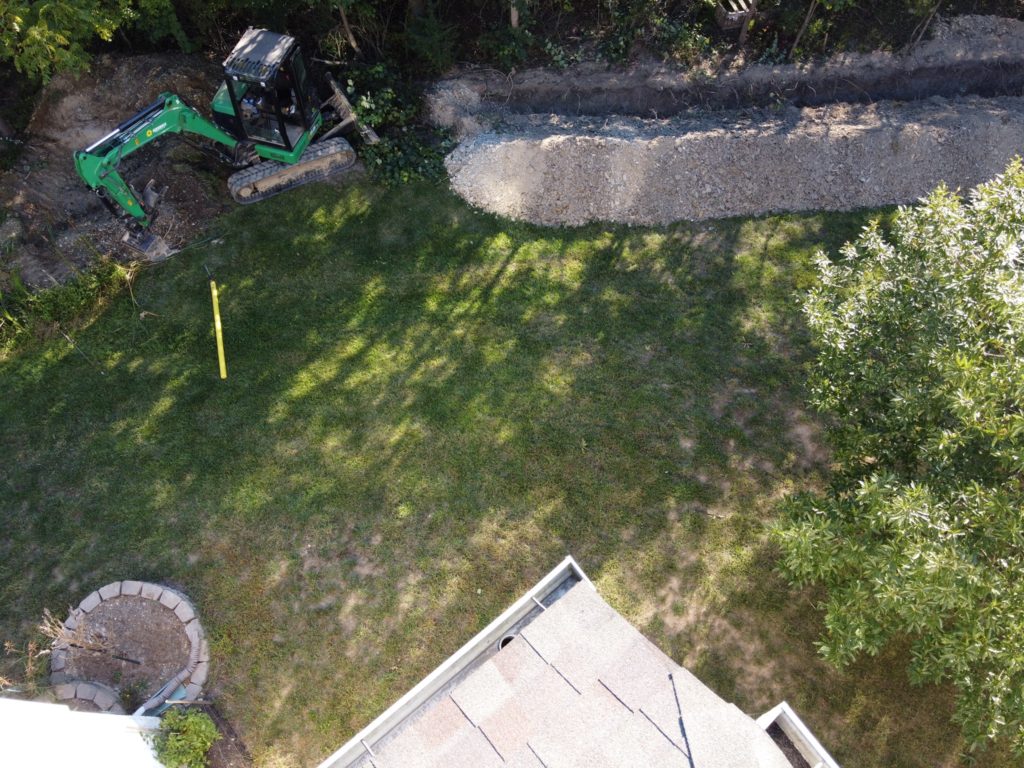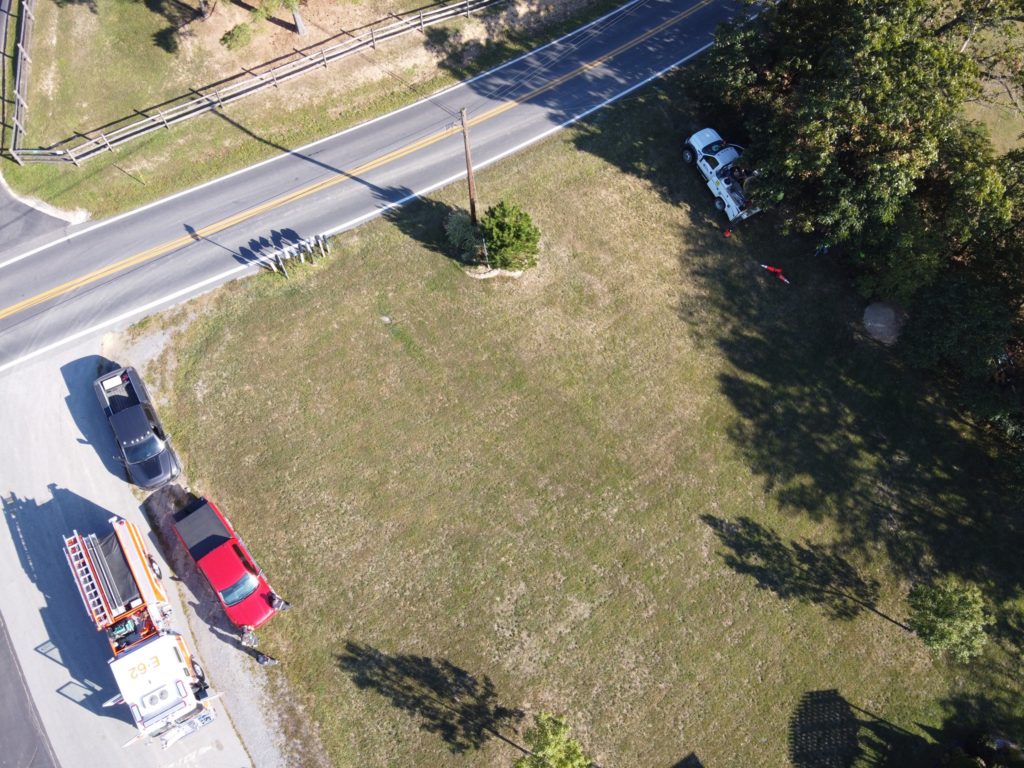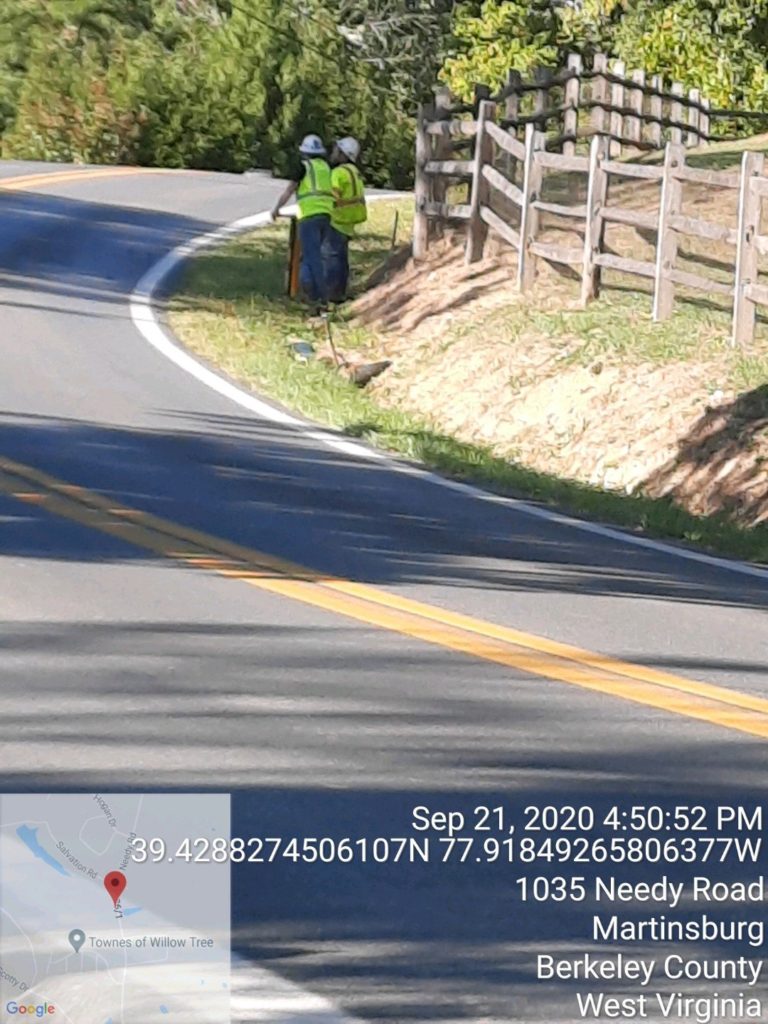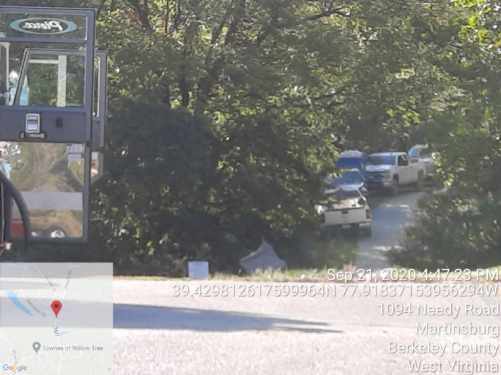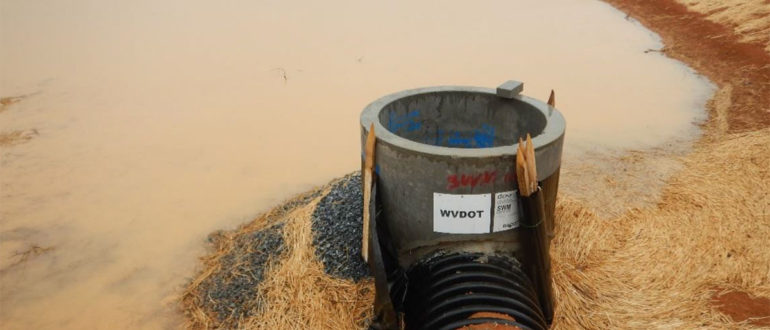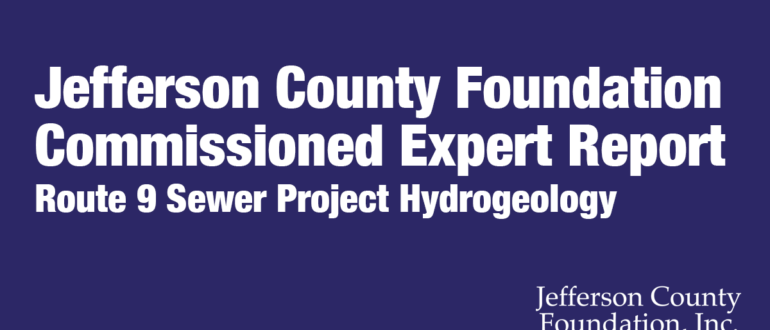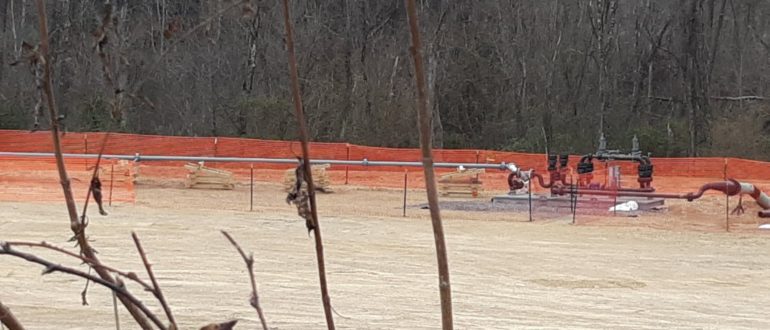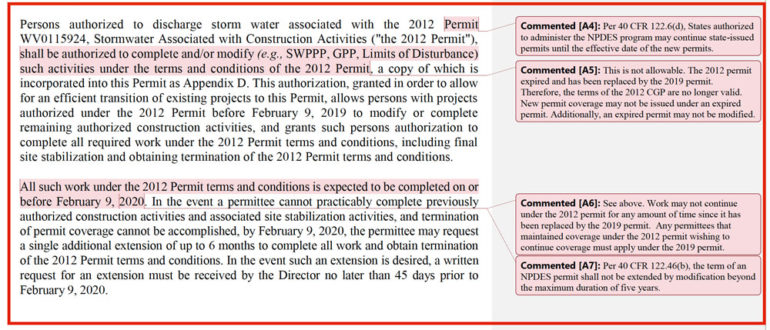The dates for the hearing have been moved from November 12 and 13 to December 10 and 11 due to judge availability. This will be a public hearing and will be open to the public to listen in. In the meantime, the Foundation is working on several new legal challenges to protect the region’s water and hold the DEP accountable. We will keep you updated.
EQB Denies All 5 of Rockwool’s Motions
On October 29, the Environmental Quality Board heard arguments on the pre-trial motions in the Jefferson County Foundation v. WVDEP and Rockwool case challenging Rockwool’s Construction Stormwater permit. Rockwool’s five motions asked the Board to preclude evidence and decide nearly all of the case before evidence is heard. After hearing arguments and reviewing the motions, the Board found IN FAVOR of JEFFERSON COUNTY FOUNDATION and DENIED Rockwool’s motions. The evidentiary hearing is set for November 12 and 13, 2020.
Mountaineer Gas Required to Obtain Valid Stormwater Construction Permit
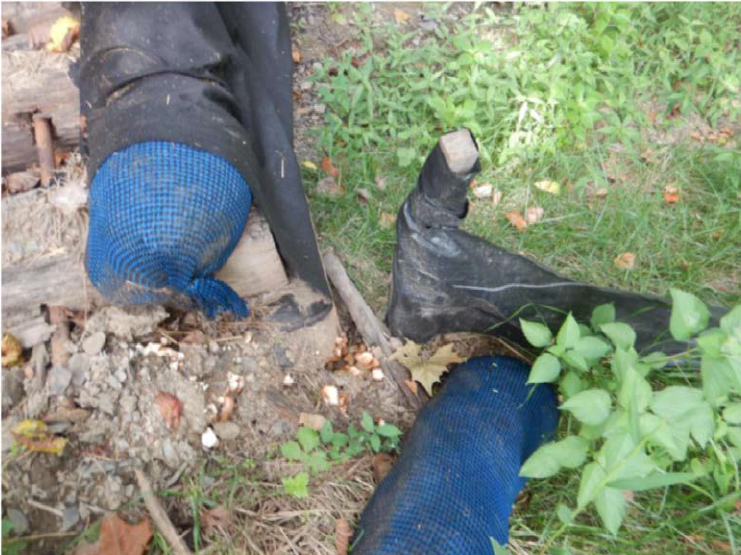
Jefferson County Foundation has submitted multiple complaints to the West Virginia DEP asking that Mountaineer Gas be required to obtain a valid stormwater construction permit and follow appropriate stormwater controls for its Arden gas line (gas line to Rockwool). Our hard work and diligence has finally paid off. This week, Mountaineer Gas finally applied for a permit to cover this work after a notice of violation pursuant to a Foundation complaint. Mountaineer Gas is still not complying with several regulations and we continue to urge the DEP to require they stop work until they do so. We’re currently awaiting the DEP’s most recent inspection report.
Why do we push so hard for stormwater protections? Stormwater protections are important for protecting the water resources from contamination with construction pollutants (sediment, nutrients, bacteria, petroleum products, debris, and other pollutants).
DEP Pushes Rockwool to Answer Many Errors in NPDES Permit
The Good News: the DEP is now taking the Foundation seriously; however, Rockwool is not doing enough to address these concerns.
The DEP is now pushing Rockwool to answer for some of the many errors and issues in their NPDES permit. A recent letter from Rockwool’s hired consulting firm, ERM, goes over 10 comments from the DEP to Rockwool about issues with approving their permit. All 10 of them – every single one of them – came from the Jefferson County Foundation public comment to the DEP from November 2019.
We still need transparency from Rockwool and due diligence by the DEP to ensure the water resources are thoroughly protected.
See the side-by-side comparison
This is the power of public comments. This is the power of holding the DEP accountable through litigation. This is why we continue to put pressure on the DEP to do their job and to hold Rockwool to the standard of the law, the law that protects the natural resources. This is the water that sustains our health, welfare, and local economy, and we will stand up for the residents of this county and region protecting those natural resources.
Mountaineer Gas Explosion Highlights the Lack of Adequate Oversight
There was a natural gas explosion on Salvation Road in Berkeley County on Monday, September 21 sending pressurized gas up to 100 feet in the air—only feet from a residence—which caused all homes and businesses in a 330-foot radius from the blast to be evacuated. The company putting in the gas line to Rockwool, Mountaineer Gas Company, is constructing without any permits on record.
MGC working without a permit
For the last eight months, Jefferson County Foundation, in partnership with the Eastern Panhandle Protectors, has been working to monitor Mountaineer Gas Company’s construction activity on this pipeline. The company is installing a new gas line in the same location as an old, no longer in service gas line so they can utilize the rights-of-way. Several complaints have been filed with the DEP and despite several inspections, Mountaineer Gas has repeatedly convinced the DEP that this construction project is a few segments of pipeline being replaced for safety reasons. In fact, in the inspection report from March 2020, the DEP inspector reported that Mountaineer Gas said they would seek a permit before pursuing the section of pipeline they are currently working on where the explosion was on Monday. Mountaineer Gas has not obtained this permit.
Last week, the PSC told Jefferson County Foundation that Mountaineer Gas was not building pipeline in Berkeley County. The accident is a glaring example that this is simply not true. From a search of the Department of Transportation (DOT) division Pipeline and Hazardous Material Safety Administration (PHMSA) database, it seems they have no registration for Mountaineer Gas building pipeline or distributing natural gas in Berkeley County. A FOIA of the administration for this information has as of yet not been fulfilled yet.
“This incident is an example of the careless manner in which Mountaineer Gas is installing the gas pipeline to Rockwool. We have again and again tried to get Mountaineer Gas to have the pipeline appropriately permitted, but they have refused to do so,” states Dr. Christine Wimer, president of Jefferson County Foundation. “The regulators are all too happy to oblige Mountaineer Gas’s obfuscation of the regulatory requirements. The regulators have abandoned their post of protecting the public. This cannot be tolerated.”
Tracy Cannon, president of Eastern Panhandle Protectors, said, “I was just at the site at 5:00 p.m. and could still smell the gas. I’ve been watching the pipeline construction in the Eastern Panhandle closely for two years now. I’ve often been concerned about what I saw. Mountaineer Gas Company has been installing new pipeline on Salvation Road without removing the old pipeline first. I was worried that something could go wrong, but I’m still shocked that this happened. Thankfully no one was injured.”
Ranson and the DEP Violate the Clean Water Act at Road to Rockwool
Jefferson County Foundation sends Notice of Intent to File Suit
Ranson is administering the Northport Avenue road extension construction project — the road to Rockwool — for the West Virginia Department of Highways without a valid construction stormwater permit. The project has been inspected by the West Virginia Department of Environmental Protection (DEP) three times and each time, Ranson has had violations. Jefferson County Foundation filed a Notice of Intent to file suit on Friday, August 7. “Our hope is that Ranson will apply for a valid Construction Stormwater General Permit Registration (CGPR) under the 2019 General Permit,” states Foundation president, Christine Wimer. “We want the DEP to require Ranson and all such entities to obtain a valid construction stormwater general permit registration. And we want the EPA to require the DEP to abide by the EPA’s objection to the DEP allowing entities to continue to operate under the invalid and less protective 2012 permit.”
Background:
The Northport Avenue extension is a project administered by the City of Ranson for the West Virginia Department of Highways (WVDOH) to extend the road and utilities in front of Rockwool. It comprises approximately 0.65 miles (or approximately 3200 LF) of a multimodal Urban Local Road and utilities that will extend the existing Northport Avenue from West Virginia Route 9 to the northern boundary of the former Jefferson Orchards parcel with a reported limit of disturbance of 24.4 acres.
Ranson accepted bids for this project from February 13, 2019 to March 11, 2019. The project was awarded to Jefferson Asphalt on April 2, 2019 by a vote of the city council (Resolution #2019-13 – A Resolution of the City Council of Ranson, West Virginia Approving a Contract with Jefferson Asphalt for the Construction of Northport Avenue).
Permitting:
A Construction Stormwater General Permit Registration (CGPR) has been applied for three times for this project by the City of Ranson.
The CGPR application was first applied for, for this project on July 23, 2018 under the 2012 Construction Stormwater General Permit (CGP). This application was terminated on December 14, 2018, by the DEP for lack of response by Ranson to DEP requests.[1] Ranson started a second Construction Stormwater General Permit Registration application on January 9, 2019. The permit was issued less than a month later on February 6, 2019. In this application, it was stated that construction would start on February 1, 2019 and end by December 31, 2019. As this was less than one year, no public comment or public notice was provided for.
The last (chronologically) comment from the permit reviewer on February 5, 2019 stated:
“The re-issued permit, WV0115924, effective February 9, 2019 requires that all BMP’s listed in the application are required to be ENHANCED BMP’s. This permit can [be] found on our website:”
“All permits issued between Feb. 9, 2018 & Feb. 9, 2019 will be given an opportunity to submit a form stating that they will be following the new permit.
This permit application has shown that “silt fence” will be used rather than the Enhanced BMP “Super Silt Fence” or “Belted Silt Fence”. Please replace these in your application and make this correction on all of your maps and narrative showing that the Re-issued Permit will be followed.”
Clearly it was the intention of the DEP to approve the permit by February 9, 2019 to afford the city of Ranson the opportunity to qualify for this provision, and allow Ranson to avoid applying under the 2019 permit. This comment was at least partially addressed by the city. In the SWPPP, 4 of the 11 times that silt fence is referred to, it was updated to belted silt fencing. However, the much larger issue here is that the permit reviewer incorrectly implies that the only difference between the 2012 and 2019 is the Enhanced BMP. This is an egregious oversimplification. Most notably, this project would have to have a stand-alone project specific GPP (Groundwater Protection Plan) with a Karst Mitigation Plan. This was not done.
Nevertheless, after issuance of the permit registration on February 6, 2019, this project was not started in February as initially planned.
On June 7, 2019, a reissuance of the registration under the 2019 permit was applied for and granted on September 11, 2019. This application was incomplete with only 7 out of 20 sections submitted and provided for; no substantive changes to the actual stormwater handling. The only two changes were to the signature page, now referred to the 2019 general permit, and the timeline was lengthened to over one year. No actual review of this application seems to have been done with no comment or applicant comments recorded, and no record of review in the application tracking page.
The City of Ranson is now operating this project under this reissuance and has incurred multiple violations.
Northport Avenue: A Timeline
Issues:
The DEP seems to have rushed Ranson’s registration application for this project such that Ranson would avoid having to reapply under the 2019 permit. The DEP did so by approving the permit registration just two days before the deadline and less than 30 days after the application was first initiated. Only a cursory attempt was made 24 hours before the application was approved to bring it up to the standards of the 2019 general permit. Only a few words were changed and no substantive changes were made. Most notably, a Karst mitigation plan was not required. Several months later, prior to the start of construction, the permit was reissued under the 2019 general permit with no change to the substance of the application. The only change was to the timeline, which was lengthened from 11 months to more than 13. No public notice or comments were performed, as required by the permit conditions of the 2019 (and 2012) permit. Here in this case yet again we have no public notice and an end run around the 2019 permit conditions.
Though Ranson has a registration under the 2019 CGP, they do not have the required elements of that registration including a site-specific groundwater protection plan and a karst mitigation plan. Without these critical components Ranson is unable to meet the requirements of the 2019 and is effectively operating under the 2012 permit conditions. Therefore Ranson’s registration is invalid, and they are operating a construction project in violation of the Clean Water Act. Jefferson County Foundation hopes this letter persuades Ranson to apply for a valid registration under the 2019 permit, the DEP to require Ranson to do so, and the EPA to force the DEP to stop allowing entities to operate under the 2012 permit conditions.
Site inspection and violations:
The site has been inspected three times (February 6, March 11, and May 14) and incurred two notices of violations (February 6 and May 14). They repeatedly have the same violations and have even been found to have sediment-laden water leaving the construction site. Despite the warnings and violations Jefferson Asphalt seems unable to correct the errors. For example, they have been cited all three times for not having an outflow marker (permit cite evaluation number 4). Not only are they operating without a valid CGPR, but they are incurring multiple violations endangering the water resources of the county and region.
[1] Quoted directly from the Application Milestones page of the application RANSON, CITY OF New NPDES/State Storm Water Construction #1 WVR110004
Hydrogeology Expert Confirms: Groundwater at Risk for Contamination in Route 9 Sewer Project
Jefferson County Foundation has received and submitted to the West Virginia Environmental Quality Board, a significant hydrogeology report, confirming that the waters of Jefferson County — and the Chesapeake Bay Region — are at risk from the construction of the Route 9 Sewer Project. In the report, which has been submitted to the Board in the Sewer Line litigation, the expert concludes:
“…the most concerning potential risk from both construction and operation of sewer line is for groundwater contamination. In the case of a pipeline failure (more common in karst areas than others because of the potential for loss of structural support) groundwater contamination could be catastrophic in ecological terms (the federally threatened Madison Cave isopod lives within the karst aquifer of Jefferson county) and creating human disruptions by polluting groundwater, springs, and the surface waters to which these springs flow.”
This report was prepared as part of Jefferson County Foundation’s appeal of the DEP Unilateral Order 9080 that allows Charles Town to operate the Route 9 Sewer Project without a valid NPDES stormwater permit in violation of the Clean Water Act. This assessment is important far beyond the litigation that the Foundation is participating in. We urge you to read it and share it with others that wonder what this fight is all about. You can view the report here.
[wpdm_package id=’2369′]The evaluation, reports, and testimony of this caliber expert can cost thousands of dollars. The Foundation is committed to pursuing what we need to achieve our goals but we need your financial help! If you are able, please make a fully tax deductible donate to Jefferson County Foundation and THE FOUNDATION LEGAL FUND. Help spread the word!
Columbia Gas Needs a New Certificate – FERC Needs to Hear From You
There’s an opportunity to help prevent a gas pipeline to Rockwool from being complete and the clock is ticking. Please consider sending in a comment asking the Federal Energy Regulatory Commission (FERC) to deny this permit. We’ve outlined talking points for you to submit comments either via the FERC eFiling site or via mail. Comments are due July 30.
What Happened
Columbia Gas Transmission, LLC, a subsidiary of TransCanada originally obtained a Certificate of Public Convenience and Necessity (CPCN) from the Federal Energy Regulatory Commission (FERC) on July 19, 2018 for an 8-inch, 3.37-mile fracked gas line from Fulton County, Pennsylvania into Morgan County, West Virginia. This line would connect an existing Columbia Gas line in burrow under the Potomac River and connect with the Mountaineer Eastern Panhandle Expansion Project pipeline in Morgan County, West Virginia. This line would eventually service the Rockwool plant in Ranson.
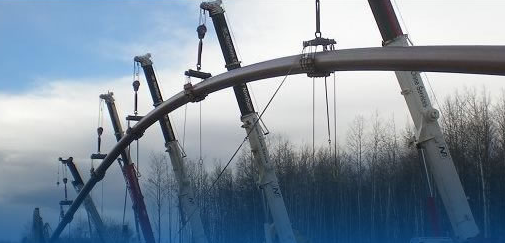
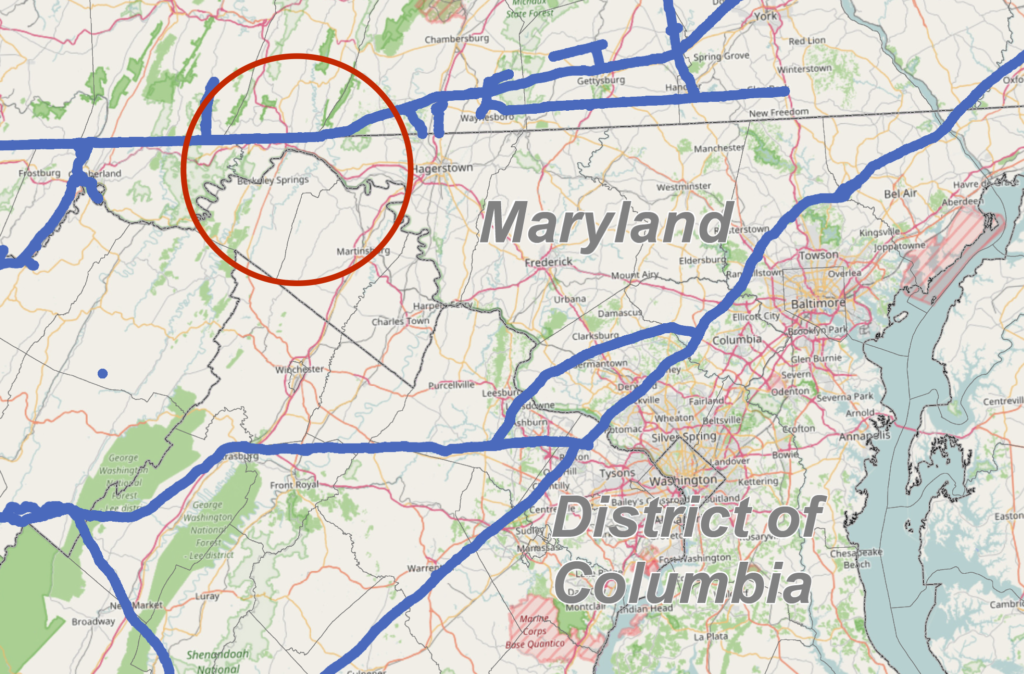
The pipeline would be installed under the Potomac River using Horizontal Directional Drilling (HDD). Compared to traditional trenching, HDD can reduce the amount of sediment generated during pipeline river crossings construction. However, the installations of the pipeline with HDD still has the potential to cause environmental damage through inadvertent releases of drilling fluids. Adverse environmental effects that can be expected from drilling fluid releases are likely to be similar to those resulting from sediment discharges. The current available literature focuses on toxicity of drilling muds and the individual components of the mud. Directional errors can also be made when drilling, and long-term studies of the pipe integrity are lacking.
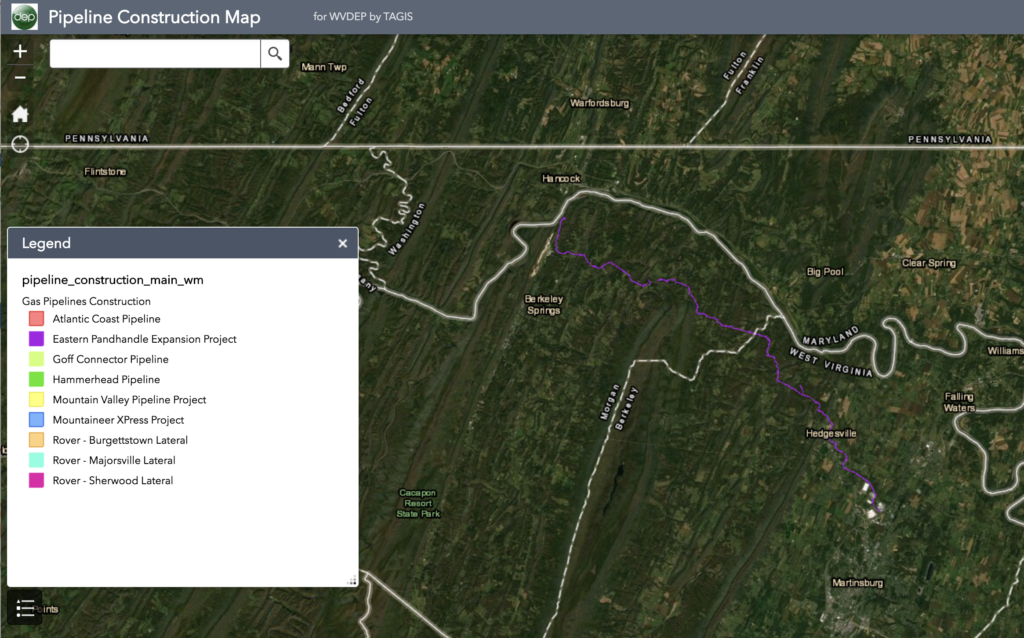
According to 65 Maryland delegates and senators, the pipeline will affect 10 wetlands and 19 streams in addition to crossing the Potomac River, which provides drinking water to more than 6 million people east of the crossing site. In January of 2019, Maryland Board of Public Works denied Columbia Gas a right-of-way permit under the Western Maryland Rail Trail. In August 2019, a federal court upheld the denial, and Columbia Gas is appealing. Thus, the project is currently on hold.
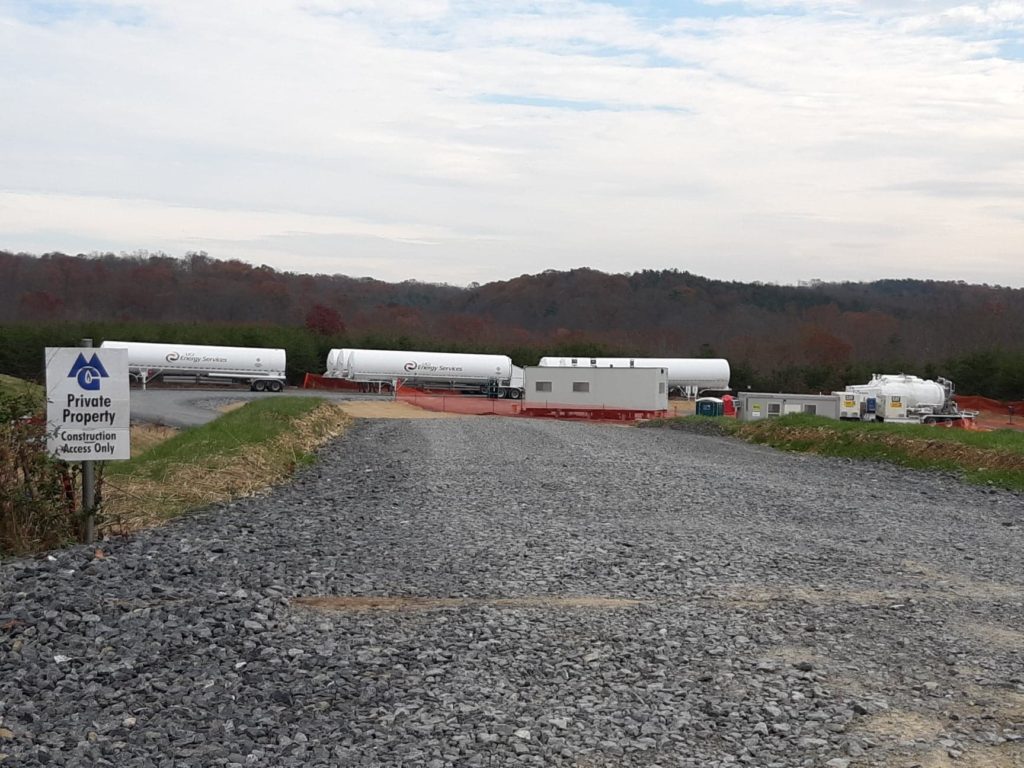
Since this project has been put on hold, Mountaineer Gas has found an alternative to provide Rockwool with the natural gas supply that it needs. From October 2019, Mountaineer Gas was building a receiving area for natural gas at the US Silica property on RT. 522. in Berkeley Springs.
We know that Mountaineer Gas is working on obtaining property in Berkeley County to build a Compressed Natural Gas facility to inject gas into the Route 9 Extension Project pipeline piece that was constructed in 2019 in order to deliver natural gas.
This project is simply not worth the risk, especially with the new information available in the last two years.
Legal Requirements for Extension of Permit
The Commission applies a two-part test in weighing extension Requests:
Part 1: Has the applicant demonstrated good cause for extending the deadline? 61,081, at ¶ 9 (2018).
Part 2: Is the project still required by public convenience and necessity and has there been “significant new circumstances or information relevant to environmental concerns”. Id ¶ 16-17.
These Requirements Are Not Met
- The applicant Columbia Gas does not demonstrate good cause for extending the deadline.
- The lawsuits that resulted in the delay were foreseeable and therefore Columbia has not shown good cause for an extension.
- These lawsuits may make it necessary to reroute the pipeline. Rerouting the pipeline would require a new application. Therefore, this certificate should not be extended. In fact, a new route that is more environmentally friendly should be proactively sought.
- The project is no longer required by public convenience and necessity.
- There is no need for the pipeline now that mountaineer Gas has found an alternative gas supply. Therefore, the need does not outweigh the risk.
- There is significant new information relevant to environmental concerns.
- New information about the risk and potential impacts on public health and safety posed by horizontal directional drilling under the Potomac River and C & O Canal since the original Certificate of Public Convenience and Necessity was issued. This Risk is not outweighed by the need.
- This type of drilling can cause contamination of waterways and damage to structures. Check out this recent article.
- The climate change impacts of burning the natural gas transported by this pipeline is now even more well understood, and this should be avoided in favor of more environmentally friendly methods.
- This pipeline will support the future expansion of fracked gas extraction in Pennsylvania the environmental impacts of fracked gas are now understood to be even more negative than before and should not be facilitated by more pipeline infrastructure.
- Natural gas as a commodity is under decreasing demand, therefore, it doesn’t make sense to build more infrastructure to support it.
What Can You Do?
Send FERC a comment via their e-filing system or manually via US Postal Service or any carrier:
The commission encourages electronic filings of comments, protests and interventions by using the “e File” link at www.ferc.gov. The case is Docket No. CP17-80-000. Comments are due before 5 p.m. Eastern Time on July 30, according to the notice.
In lieu of electronic filing, you may submit a paper copy (but must be at FERC by July 30).
Submissions sent via the U.S. Postal Service must be addressed to: Kimberly D. Bose, Secretary, Federal Energy Regulatory Commission, 888 First Street NE, Room 1A, Washington, DC 20426.
Submissions sent via any other carrier must be addressed to: Kimberly D. Bose, Secretary, Federal Energy Regulatory Commission, 12225 Wilkins Avenue, Rockville, Maryland 20852.
Suggested letter text you may copy, paste, personalize, and send. Please be sure to add the RE to the start of your letter.
Re: Columbia Gas Transmission, LLC, Docket No. CP17-80-000, Eastern Panhandle Expansion Project, Request for Extension of Time, Response in opposition and request for denial
Dear Federal Energy Regulatory Commission Members,
Columbia Gas Transmission LLC, has not demonstrated good cause for extending their Certificate of Public Convenience and Necessity (CPCN), new information is available about the negative environmental impacts of this project, and it no longer fulfills a public convenience or necessity. The extension should therefore be denied.
The resistance to this project and possible denial of right-of-ways with ensuing legal battles were foreseeable. Columbia Gas should not have applied for the certificate until they had all the necessary right-of-ways and approvals. These challenges may require the pipeline be rerouted necessitating a new certificate all together. Therefore Columbia Gas has not shown good cause for an extension and it should be denied.
The project is no longer required by public convenience and necessity. There is no need for the pipeline now that Mountaineer Gas has found an alternative gas supply. It is becoming increasingly obvious that fracking is bad for the environment in a multitude of ways. Fracked natural gas is in declining demand due to these concerns and other economic pressures, and further new infrastructure to support this declining commodity should not be supported. Therefore, the need does not outweigh the risk.
There is significant new information relevant to environmental concerns over both the instillation of the pipeline and the fracking industry that it supports. While hydraulic directional drilling (HDD) maybe less impactful than traditional trenching, installation of the pipeline with HDD still has the potential to cause environmental damage through inadvertent releases of drilling fluids into the river, errors in direction of drilling and issues with the installed pipe. The Potomac provides water to over 6 million people downstream of this location and feeds the Chesapeake Bay. This project would also affect 10 wetlands and 19 streams. This project is simply not worth the risk to the environment.
Please deny the request by Columbia Gas for an extension of the CPCN for the Eastern Panhandle Expansion Project, Docket No. CP17-80-000, because they have not demonstrated good cause, lack necessity and pose undue risk to a critical resource and the environment.
Is the EPA turning a blind eye to WVDEP?
Watershed protection organizations from three states plead with the EPA to make West Virginia follow the Clean Water Act
A coalition of advocates has asked the Environmental Protection Agency (EPA) to investigate the actions of the West Virginia Department of Environmental Protection (WVDEP), a state agency charged with protecting the environment but which appears to have allowed hundreds of polluters to operate in violation of the Clean Water Act, putting the surface and ground waters of the Chesapeake Bay and Ohio River Valley watersheds at risk. Documents recently obtained by Jefferson County Foundation show that the DEP advised the companies how it was going to assist them in avoiding operating without a permit, but never told the public.
[wpdm_package id=’2319′] [wpdm_package id=’2317′]What Happened?
On January 10, 2019, the WVDEP submitted its draft of an updated Construction Stormwater General Permit (General Permit) to the EPA. On February 8, 2019, the day before it was to take effect, several industry groups appealed the new General Permit, and a stay was issued by the West Virginia Environmental Quality Board (EQB), the quasi-judicial review agency overseeing the Water and Waste Division of the WVDEP, allowing covered entities to continue to operate under an expired permit which dated back to 2012 and lacked the more-protective provisions that would have been in the 2019 General Permit. The EPA, in an October 31, 2019 specific objection letter, roundly rejected a new draft General Permit that the WVDEP submitted to it, citing backsliding, unenforceable ambiguity, and violations of the Clean Water Act. The EPA advised the WVDEP that the 2012 permit was expired and had been replaced, and directed the WVDEP not to allow any entity to continue operating under the 2012 permit or its conditions.
The WVDEP did not incorporate the suggested changes from the EPA and withdrew the draft revised permit from consideration. The WVDEP then took two even worse actions. First, the WVDEP allowed the issuance of General Permit registrations without valid applications or required materials. Second, in March of 2020, the agency issued 697 unilateral enforcement orders—almost entirely in one day—allowing entities to continue working under the 2012 General Permit. These irregularities are allowing the WVDEP to circumvent the normal permitting process and avoid complying with EPA’s requirements.
Meanwhile, the EPA has remained painfully silent for months, even though hundreds of entities in West Virginia are operating without a valid Clean Water Act permit. Jefferson County Foundation, along with watershed protection organizations from three states, have sent a formal letter of inquiry to the EPA pleading with the federal agency to exercise its oversight powers to find out why this has happened and take action to correct the situation urgently.
Lack of regulation and oversight could prove detrimental to the Ohio River Valley and Chesapeake Bay watersheds
These irregularities in process will lead to more sediment in the runoff from hundreds of construction sites entering the waterways. This can damage or destroy habitats, kill plants, and other vertebrate and non-vertebrate organisms within the water, and on the beds and banks of these waterways. Loss of vegetation can lead to further erosion and damage to the banks of waterways. Increased sediment can also affect water treatment plants and waterway recreation. The effects can further challenge rare or endangered native plant species and other vertebrate and invertebrate organisms.
In areas of karst hydrogeology, the groundwater is also at risk, affecting drinking water, and invertebrates that inhabit cave water. This includes the federally threatened Madison Cave Isopod. In the Chesapeake Bay watershed, the WVDEP’s cavalier approach means that entities are not following the newest standards to protect the bay. Clearly these actions by the WVDEP pose an unacceptable risk to water quality.
“Our goal is to make sure the WVDEP is doing their job in protecting the ground and surface water resources in West Virginia and beyond,” states Dr. Christine Wimer, president of Jefferson County Foundation. “We want the EPA to make sure that the DEP does it right; no more free passes for corporations and industries that are being allowed to skate by. Our water depends on it.”
The letter was co-signed by:
- Jefferson County Foundation, Inc.
- Aileen Curfman, Co-Chair, and Jim Kotcon, Conservation Chair, WV Chapter of Sierra Club
- Linda Frame, President, West Virginia Environmental Council
- Vivian Stockman, President, The Ohio Valley Environmental Coalition
- Rosa P. Hance, Chair, Maryland Chapter Sierra Club
- Paul Walker, Group Chair, Sierra Club Catoctin Group
- Christopher G. Miller, President, The Piedmont Environmental Council
- Brent Walls, Upper Potomac Riverkeeper
- Gail Kohlhorst, Chair, Eastern Panhandle Sierra Club
- Larry Thomas, President, West Virginia Highlands Conservancy
- Betty L. Wiley, President, Dunkard Creek Watershed Association, Inc.
- Jeff Iliff, Advocacy Committee Chairperson, Warm Springs Watershed Association
- Kevin Sellner, PhD, Senior Scholar (retired), Hood College, Center for Coastal & Watershed Studies
- John Doyle, Member, West Virginia House of Delegates, 67th district
- Sammi Brown, Member, West Virginia House of Delegates, 65th district
Foundation Sends Inquiry to the EPA: What did they know?
There are over 690 entities — including the City of Charles Town —operating in West Virginia without a valid General Stormwater Construction Permit, because the 2012 permit expired and the 2019 permit has not been issued (or, it was issued, appealed, revised, rejected by EPA, and withdrawn by the DEP). Jefferson County Foundation sent a letter to the Environmental Protection Agency (EPA) requesting clarity about this today.
On March 16, the DEP issued 697 Unilateral Orders to different entities across the state. This distortion of an enforcement order allows entities to continue construction projects under the 2012 construction stormwater permitting conditions. These conditions have expired, and were replaced in February of 2019. Worse yet, on October 31, 2019, the EPA directly instructed the WVDEP to not allow any entity to continue work under the 2012 permit conditions. One of these orders was given to Charles Town to allow the construction of the Route 9 sewer project to continue even though Charles Town did not apply for a permit in time.
Jefferson County Foundation is appealing this Order at the Environmental Quality Board (state administrative court) and we have been trying relentlessly to determine, via phone call, email, and FOIA, what the EPA knew and when they knew it. Today we sent this letter to the EPA. Read on (click below).
If you would like to help support our efforts, please consider a tax deductible donation.


